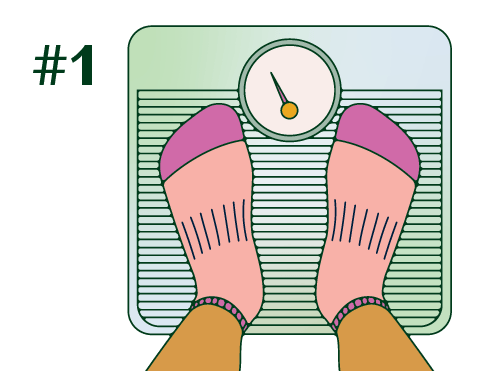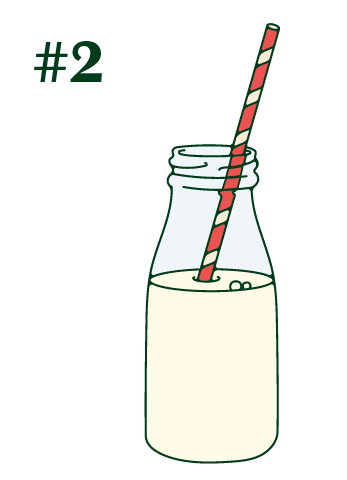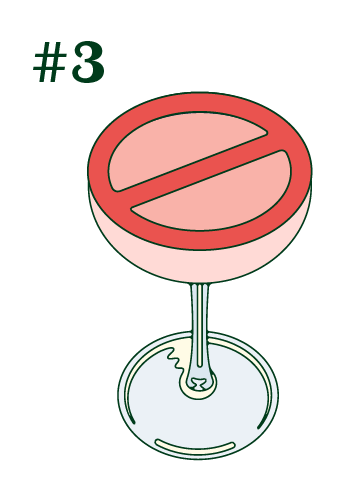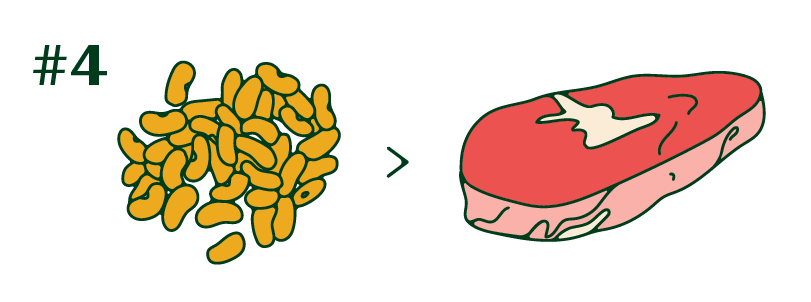For couples trying to get pregnant, the journey can be full of hope and excitement, as you prepare to grow a new life and welcome it into the world. However, for the 9 to 15% of couples with fertility problems, this journey can also be one plagued with fear and frustration, especially for those who are struggling to pinpoint exactly what the issue is.
When navigating through the countless posts offering advice and guidance on the internet, an increasing body of research points to the link between diet and fertility, making it a pretty hot topic in the medical world today. So, can your diet really impact your chances of getting pregnant? Below, we will dive into the science of dietary patterns, exploring how the foods we choose to eat (or abstain from) can impact the fertility of both partners.
The importance of a healthy diet
The term 'you are what you eat' is one that is repeated pretty regularly by medical professionals, and for good reason. Food acts as fuel and provides our bodies with essential nutrients. What we choose to put into our bodies can play a huge part in our overall health and well-being, impacting pretty much everything from our energy levels to our mood. So, it would make sense, then, that the healthier a person is, the more fertile they are going to be. But people can struggle to understand what specific diets they should follow to improve their fertility, and the definition of a healthy diet is ever-evolving.
But before we dive into the nitty gritty, we want to first clarify that discussing diet can be a very sensitive topic for a great deal of us. In society today, it is easy enough to feel judged in the choices we make, especially when it comes to food. Many face pressure from so many external sources, whether it's from media portrayals of the 'ideal' body, cultural expectations, family teachings, and of course - personal insecurities.
The last thing we would want to do is pressure you to eat a certain way or cut out foods entirely. Plus, with the added pressure of pregnancy-related issues, it can be easy to feel out of control, or uncertain about whether you’re doing the right thing. We’ve put together this article to explore some of the current science about food and fertility, but that doesn’t mean these are hard and fast rules you must follow all of the time. As Daye's in-house nutritionist Natasha Evans says, "It's all about balance. See if you can optimise 80% of your diet and don't worry about the rest. I’m a firm believer that food isn’t just for nourishment, but for enjoyment, celebrating cultures and making memories." In short, your diet choices are personal to you – this is a judgement-free zone!
Let’s get into it.
The science behind your diet and reproductive health
Reproductive health is complex and can be influenced by various factors, including genetics, environment, and lifestyle. Within it, diet plays a crucial role, supplying essential nutrients to your reproductive system to make sure that it functions optimally.
The most studied diet for fertility is the Mediterranean diet, which primarily focuses on the consumption of whole, minimally processed foods, based around the following foods:
- An abundance of colourful fruits and vegetables, provides essential vitamins, minerals, and antioxidants.
- Whole grains like whole wheat, oats, brown rice, rye, barley, and corn, preferably minimally processed.
- Healthy fats, particularly extra virgin olive oil, which is used as the primary cooking fat. Nuts, seeds, and fatty fish like salmon and mackerel, which are high in anti-inflammatory omega-3 fatty acids, are also significant.
- Legumes and nuts such as beans, lentils, and chickpeas, which are integral for protein and fibre.
- Fish and seafood with a focus on fatty fish for their omega-3 fatty acids.
- Dairy products, particularly fermented dairy or dairy from goats and sheep, are consumed in moderation.
- Poultry and eggs for quality protein
- Herbs and spices are used to flavour food instead of large amounts of salt.
The typical Mediterranean diet pyramid limits red meat intake but there’s definitely still a case to keep red meat in the diet as it is packed full of fertility-supporting nutrients like iron, zinc, B vitamins and vitamin A. Our nutritionist Natasha says, “A recent study found that a high proportion of women to be deficient in fertility-supporting nutrients most commonly found in meat and dairy. So if you’re a meat-eater, don’t worry - it can stay. Just be wary of the quality of red meat. Minimally processed meat from good farms has a very different effect on the body than ultra-processed sausages and sandwich meats!”
Meanwhile, the Mediterranean diet also advocates for limited consumption of sweets and desserts, which should be reserved only for special occasions.
This diet has been linked to a whole host of health benefits including reducing the risk of heart disease, depression, diabetes, and some cancers, but does it actually help with fertility? It certainly looks like it. Researchers have found a link between consuming this type of diet and a positive impact on fertility, highlighting the particular benefits of omega-3 fatty acids, fibre, and plant-based protein. In fact, one 2018 study found that women who followed this diet in the six months before receiving IVF had a ‘significantly better chance’ of conceiving – a 65-68% better chance of conceiving than those in the study with the lowest adherence to the diet.
What foods can boost fertility?
A balanced diet, rich in fertility-boosting nutrients can be known to improve your chances of conception. Some of these include:
- Full-fat dairy foods: Research suggests that consuming low-fat dairy foods might increase the risk of anovulatory infertility (where no egg is released), whereas eating high-fat dairy might decrease this risk. So, opting for whole milk, kefir, and full-fat yoghurt is a good idea.
- Whole grains: These help stabilise blood sugar and reduce insulin resistance, a factor known to negatively impact fertility.
- Protein: proteins are made up of amino acids, which are the building blocks of life. We also need adequate protein intake to support our sex and thyroid hormones. They’re great for balancing our blood glucose levels, which is particularly important for women with PCOS. Vary up your sources of protein to make sure you’re getting in all your essential amino acids from foods like fish, seafood, eggs, poultry, good quality red meat, tofu, tempeh, beans and legumes.
- Healthy fats: healthy fats found in foods like olive oil, avocado, salmon, mackerel and nuts can improve female fertility and semen quality in men. They’re also great for keeping our blood glucose levels stable, which influences our hormonal health. Essential fatty acids play a crucial role in hormone production and regulation.
- Dark leafy greens: the best dietary source of folate, a vital nutrient for female AND male fertility. Folate can prevent birth defects and support the early developmental stage of pregnancy. Get in at least a handful of dark leafy greens everyday, such as cavolo nero, kale, spinach, chard, rocket and watercress
- Eggs: Egg yolks are a fantastic source of an often-forgotten important nutrient in fertility - choline. Choline improves ovarian function, is crucial for foetal brain development - and even improves sperm motility
- Berries: berries such as blueberries, raspberries, blackberries and strawberries are rich in antioxidants, which can support egg and sperm quality
- Fermented foods: fermented foods like kimchi, sauerkraut, kefir, live yoghurt, kombucha and tempeh contain beneficial bacteria that support our gut and vaginal microbiomes. A healthy gut microbiome has far-reaching impacts on our health, whilst a healthy vaginal microbiome has been associated with better fertility outcomes.
What foods can harm fertility?
Unfortunately, certain food choices do have the potential to negatively impact our fertility. Be cautious of:
- Sugar: Consuming large amounts of sugar in your food and drink can have a negative impact on fertility. Studies suggest that consuming sugar-sweetened drinks, for example, can reduce fecundability for both women and men, even when adjusted for caffeine.
- Caffeine intake: While moderate caffeine consumption might not be detrimental, high intakes from sources like coffee, energy drinks, and certain sodas can harm female and male fertility.
- Trans fats: Found in many ultra-processed and deep-fried foods, trans fats can increase the risk of ovulatory infertility.
Alcohol: Excessive consumption can harm both egg and sperm health
Tips for a healthy fertility diet
If you are wondering about some of the best ways you can amend your diet to improve fertility, check out some of our tips below.
Tip #1: Maintain a healthy body weight.
Your weight can impact your fertility. Being both underweight or overweight can affect hormone levels, making it harder to conceive.
However, with this in mind, we don’t recommend relying solely on body mass index (BMI), which has been found to be inaccurate and misleading as a way of measuring health. To get an accurate measure, you should consider your entire bodily composition, and aim for a good level of muscle mass.
Adopting the principles of the Mediterranean diet can be a great place to start to support a healthy weight.
Tip #2: Don’t be afraid of fat.
The myth that eating fat makes you fat is exactly that: a myth. Eating healthy fats can overall health, hormones and egg and sperm quality, so incorporate full-fat dairy, oily fish, avocados, nuts and olive oil into your diet. For example, the dairy study mentioned earlier in this article suggests that switching to whole milk or enjoying full-fat yoghurt might support fertility. Bonus points for choosing a probiotic live yoghurt, which contains beneficial bacteria that may support a healthy vaginal and gut microbiome.
Tip #3: Limit caffeine and alcohol consumption
There’s no need to cut them out entirely, but moderation is key. Reducing your intake is a good idea if you're trying to conceive. National guidelines suggest having no more than 1-2 caffeinated drinks per day, and no more than 4 alcohol drinks per week. The NHS says for anyone who is trying to conceive it is safest for the baby not to drink at all.
Should I use supplements if my diet is already healthy?
Great question. Well, even if you maintain a healthy diet, certain fertility-boosting nutrients like folic acid,vitamin D and omega-3 might be required in higher amounts when trying to get pregnant. Talk to your healthcare provider about supplements that might benefit your specific situation. Remember, supplements should complement, not replace, a balanced diet. It is recommended to start taking prenatal vitamins 3 months before you conceive. These should ideally include a quality source of iron, magnesium, calcium and folic acid.
Another option is to take ProViotics, supplements of the friendly bacteria that help keep your vaginal and gut health shipshape. A healthy vaginal microbiome typically consists of a predominance of lactobacilli, which help maintain an acidic environment in the vagina – crucial for protecting against infections and maintaining the health of the reproductive tract. A balanced microbiome is thought to be beneficial for conception and maintaining a healthy pregnancy. On the other hand, an unbalanced microbiome may affect the cervical mucus, making it harder for sperm to survive and reach the egg, or even increase the risk of conditions like bacterial vaginosis (BV) which has been associated with increased risks of preterm birth, miscarriages, and infertility.
If you’re trying to get pregnant, diet obviously plays a major role. However, we recommend also looking to your vaginal microbiome to ensure you’re giving your body the best possible chance of success. That’s why we offer an at-home test kit to unlock key information about the bacteria living in your microbiome, helping inform your fertility journey.
Should I use supplements if my diet is already healthy?
It’s clear our diet plays a significant role in affecting a wide range of areas of our health, from fertility to endometriosis and more. From the essential role of healthy fats to the potential risks of excessive caffeine intake, it's evident that our food choices can either support or harm our reproductive capabilities.
By focusing on a fertility diet rich in fruits, vegetables, whole grains, healthy fats and good quality sources of protein, and by being mindful of potential dietary pitfalls, couples can better their chances of experiencing the joys of parenthood. Remember, every individual is different, and what works for one might not work for another. It's always best to consult with a healthcare provider or nutritionist to determine the best fertility diet for your specific needs.


.png?ixlib=gatsbyFP&auto=compress%2Cformat&fit=max&w=1080&h=1080)







